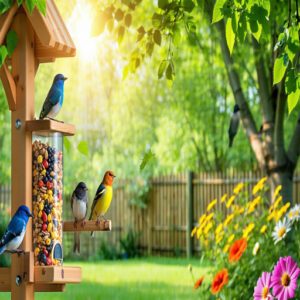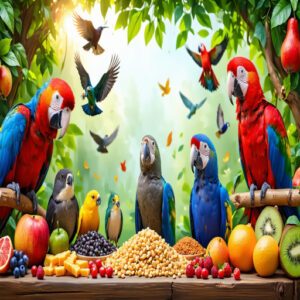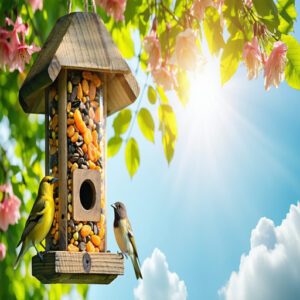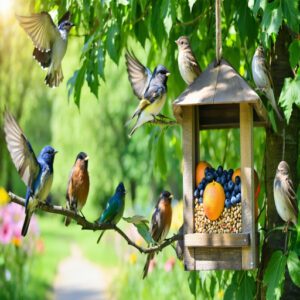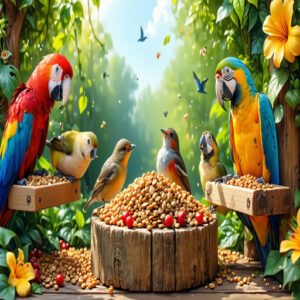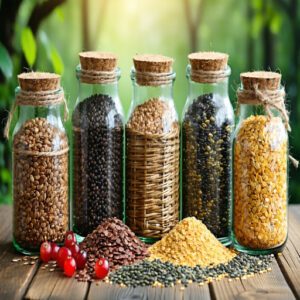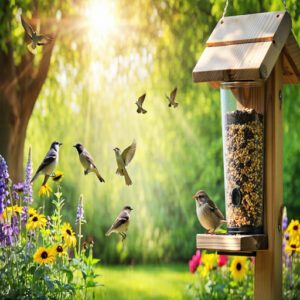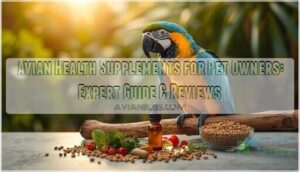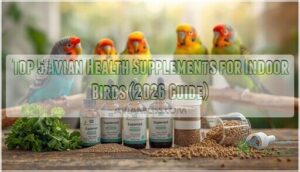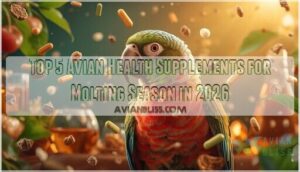This site is supported by our readers. We may earn a commission, at no cost to you, if you purchase through links.
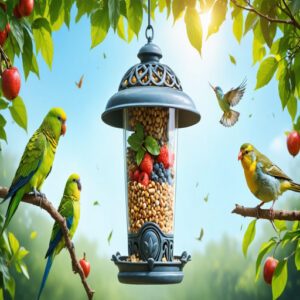
These foods skip the artificial additives and fillers, offering non-GMO nutrition packed with grains, legumes, and probiotics to boost gut health and immunity.
For small birds like parrotlets, try Organic Bird Pellets for Small Hookbills; larger birds will thrive on an Organic High Potency Formula. Always check labels for harmful extras and keep their diet balanced with fresh veggies and fruits.
Ready to enhance your bird’s vibe? Let’s explore the best picks next!
Table Of Contents
- Key Takeaways
- Benefits of Organic Bird Food
- Choosing Organic Bird Food
- Top 6 Organic Bird Foods
- Bird Care and Nutrition Tips
- Selecting The Right Birdseed
- Frequently Asked Questions (FAQs)
- What is the best bird food for my garden birds?
- Is top’s parrot food organic?
- What foods do birds eat?
- Can birds eat seed based diets?
- Which bird pellets are best?
- Why do birds eat pellets?
- What is the healthiest thing to feed birds?
- What is the best natural bird food?
- What is the cheapest way to feed wild birds?
- What is the best homemade bird feed?
- Conclusion
Key Takeaways
- Choose USDA Organic-certified bird food to ensure clean, non-GMO nutrition that supports your bird’s gut health and immunity.
- Match the food to your bird’s size, species, and life stage, and avoid fillers, artificial additives, and allergens like soy or wheat.
- Rotate organic pellets with fresh fruits and veggies for a balanced diet that mimics their natural feeding habits.
- Store bird food properly to maintain freshness and maximize nutritional value while keeping water clean and available at all times, supporting overall bird’s immunity and natural feeding.
Benefits of Organic Bird Food
Organic bird food gives your feathered friend a cleaner, healthier diet without artificial fillers. It also supports their gut and immune systems, helping them thrive every day.
Cleaner Diet and Gut Health
A clean diet supports better gut health for your feathered friend.
Organic bird food shines with natural ingredients and probiotics that help with digestion and gut wellness.
A balanced diet should include 60-80% pelleted food options for ideal nutrition.
Skip the fillers and go for non-GMO, organic nutrition instead.
- Boost gut bacteria with probiotics.
- Support healthy digestion naturally.
- Maintain a balanced diet safely.
- Enjoy peace of mind with cleaner nutrition.
USDA Organic Certification and Safety
Switching to organic bird food isn’t just about clean eating; it’s about trust.
USDA Organic certification guarantees rigorous safety standards, from the certification process to regulatory compliance. Look for labels guaranteeing non-GMO ingredients and certified organic production.
Toxicity testing means organic bird seed is safer for your feathered friend, giving you peace of mind while they enjoy healthier meals.
Promoting Healthy Immune Systems
You care about safety, right?
Organic bird food does more than keep harmful fillers away.
It strengthens your bird’s health by boosting their immune system with probiotics and supporting healthy gut bacteria.
These probiotic benefits help build natural defenses, keeping your feathered friend strong and lively.
USDA Organic-certified options aren’t just food—they’re a step toward better bird wellness and nutrition.
Choosing Organic Bird Food
When choosing organic bird food, focus on your bird’s species, stage of life, and specific dietary needs. Check ingredient lists carefully and avoid anything with harmful or allergenic additives.
Consider Bird Species and Life Stage
Not all birds eat alike—bird size matters.
Parrot food for large birds won’t suit small ones, and life stage nutrition is key.
Age considerations, like baby birds needing softer diets or breeding diets for adults, shape organic bird food options.
Providing parrot food pellets is essential for a balanced diet.
Species-specific needs help you choose parrot food for small birds, medium birds, or larger ones precisely formulated to thrive.
Scrutinizing Ingredient Lists
Understanding food labeling makes all the difference when selecting organic bird feed.
Spot natural ingredients by checking the order—what’s listed first takes the largest share.
Keep an eye out for USDA Organic certification and nonGMO stamps.
Ingredients to avoid? Anything artificial.
To make informed decisions, learn about reading labels and their impact on bird health.
- Watch for toxic substances like dyes or fillers.
- Detect allergens such as soy or wheat.
- Avoid hidden sugars.
Avoiding Toxic or Allergenic Ingredients
Keep your bird thriving by choosing organic bird food with USDA Organic certification.
Skip artificial additives and focus on natural ingredients. Check for allergen testing, safe ingredients, and a nutrient balance to avoid harmful fillers.
NonGMO and chemical-free options guarantee toxic-free foods. Birds deserve a clean, healthy diet—ditch anything that feels sketchy and stick to trusted, natural blends!
For ideal nutrition, consider organic bird food options that cater to your bird’s specific needs.
Top 6 Organic Bird Foods
You want the best for your feathered friend, and choosing high-quality organic food is a great place to start.
Here are six top-rated options packed with nutrients to keep your bird healthy and happy.
1. Organic Parrot Food Mini Pellets
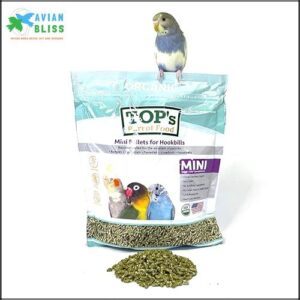
Perfect for small birds, Organic Parrot Food Mini Pellets deliver a powerhouse of nutrition.
These USDA-certified pellets are made from organic, non-GMO ingredients like millet, quinoa, and pumpkin.
Cold-pressed to lock in natural goodness, they’re free from fillers like soy or corn and artificial additives.
Birds love the mini size, though parakeet owners sometimes grind them smaller.
Packed with vitamins, minerals, and probiotics, these pellets promote better health and shiny plumage.
Affordable and wholesome, they’re a top choice for feathered friends.
Best For: Small bird owners who prioritize organic, non-GMO ingredients and high-quality nutrition.
- Made with USDA-certified organic, non-GMO ingredients.
- Cold-pressed to maintain natural nutrients.
- Free from fillers, artificial additives, and GMOs.
- Some birds may take time to adjust to the pellets.
- Pellet size may need to be ground down for smaller breeds like parakeets.
- Limited to a 1-pound packaging option.
2. organic bird food high potency formula
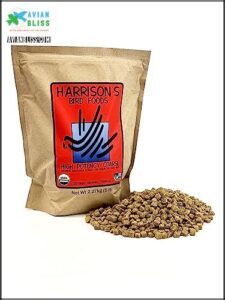
If your feathered friend needs a nutritional boost, organic bird food high potency formula might be the game-changer.
Packed with non-GMO grains, balanced omega-3 and 6, and natural vitamins, it’s crafted to promote vibrant feathers, energy, and overall health.
Ideal for birds that are molting, underweight, or breeding, this USDA-certified mix is great for medium-sized species like cockatiels or conures.
It’s highly recommended by avian vets, ensuring quality and safety. Your bird will thank you with a chirpier, healthier life!
Best For: Medium to large birds like cockatoos, macaws, and conures needing a nutrient-dense, organic diet for improved health and energy.
- Certified organic and non-GMO with natural vitamins and balanced omega 3 & 6 fatty acids.
- Supports feather regrowth, energy levels, and overall health.
- Recommended by veterinarians for breeding and special nutritional needs.
- Higher price point compared to non-organic options.
- Some birds may need time to transition to the taste.
- Requires proper storage to maintain freshness.
3. Organic High Potency Bird Food
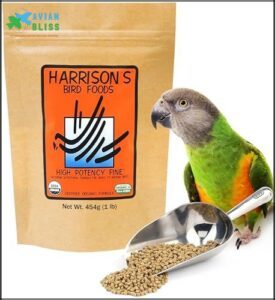
Organic High Potency Bird Food is packed with certified organic, non-GMO grains and legumes that small to medium birds thrive on.
With balanced Omega 3s and 6s, it supports shiny feathers, stronger immunity, and vibrant health.
Designed for birds at every stage, from breeding to recovery, it’s free from fillers and preservatives—just clean, honest nutrition.
Customers notice healthier weights and happier birds after switching to this food, which is suitable for birds at every life stage.
Start slow to ease the change, and pair it with fresh veggies for the perfect feather-friendly diet.
Best For: Small to medium-sized birds in different life stages, including breeding, weaning, and recovery, needing a clean and nutrient-dense organic diet.
- Certified organic and non-GMO with no fillers or artificial additives.
- Balanced Omega 3 & 6 promote feather health and immunity.
- Provides high-quality protein and essential nutrients for optimal health.
- Higher price point compared to non-organic options.
- Requires gradual introduction to avoid digestive upset.
- Limited to small and medium-sized birds, not suitable for larger species.
4. Organic Bird Pellets for Small Hookbills
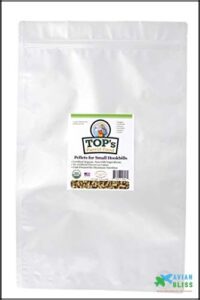
Small hookbills deserve food that matches their energy and charm.
Organic Bird Pellets for Small Hookbills are packed with nutrients like alfalfa, millet, and barley. These USDA Organic-certified pellets are free from fillers like soy and corn, ensuring your feathered friends get only the good stuff.
Suited for birds like parrotlets and conures, the 5/32" size makes them easy to enjoy. Whether fed solo or mixed with veggies, they support vibrant feathers and overall health.
Keep water handy, and watch them thrive with USDA Organic-certified pellets!
Best For: Small hookbill parrots like parrotlets, conures, and similar species needing a healthy, organic diet.
- USDA Organic-certified and made with clean, natural ingredients without unhealthy fillers.
- Supports vibrant feathers and overall bird health.
- Perfect pellet size (5/32") for small hookbills, easy to eat and mix with other foods.
- Some birds might be picky and need the pellets mixed with other foods.
- Higher price tag compared to non-organic options.
- Occasional packaging issues reported, like ripped bags or loose pellets.
5. Organic Large Bird Food Blend
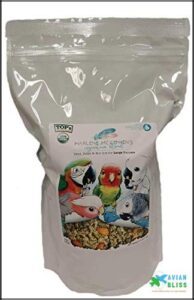
If your large bird craves variety, the Organic Large Bird Food Blend might be just the ticket.
Packed with USDA Organic Certified seeds, nuts, and pellets, it’s free from artificial junk like preservatives or colors.
Instead, it delivers wholesome nutrients from ingredients like quinoa, dandelion, and even a hint of cayenne.
This mix is designed to support digestion and overall health but remember to serve fresh daily.
Your bird deserves the best, so why settle for less? Fresh water’s a must, too, for a healthy and happy bird with access to fresh water.
Best For: Adult bird owners seeking an organic, nutrient-rich, and preservative-free food blend to support their bird’s digestive health.
- USDA Organic Certified with no artificial additives.
- Packed with a variety of seeds, nuts, and pellets for balanced nutrition.
- Supports digestive health with natural, wholesome ingredients.
- Relatively expensive compared to other bird food options.
- Some birds may take time to adjust to the taste.
- Not all packages have consistent seed and nut distribution.
6. Organic Parrot Food Bird Seed
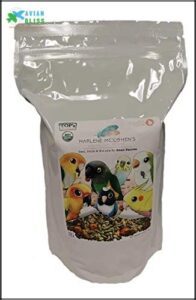
Looking for a wholesome mix to keep your bird thriving?
Organic Parrot Food Bird Seed combines USDA Organic Certified pellets, seeds, and nuts into one nutritious blend.
Free from artificial junk like BHA or preservatives, it’s packed with natural vitamins and minerals that birds need.
The mix’s variety of textures and flavors makes it an exciting option for your feathered friend.
Plus, it’s great for small parrots who love seeds like millet.
Fresh food daily keeps them happy and healthy—no compromises, with a diet that includes natural vitamins and minerals and is made complete with Organic Parrot Food.
Best For: Bird owners seeking an organic, nutrient-rich, and preservative-free diet for small parrots or seed-loving birds.
- USDA Organic Certified with no artificial preservatives.
- Includes a nutritious blend of seeds, pellets, and nuts for variety.
- Perfect for small parrots with a preference for seeds like millet.
- May contain more seeds than desired for birds needing a pellet-focused diet.
- Small pellet size may not suit medium or large parrots.
- Quality can vary depending on the purchasing source.
Bird Care and Nutrition Tips
Taking care of your bird’s nutrition means providing a balanced diet that keeps them healthy and energetic.
Rotate their food, keep water fresh, and maintain a clean environment to support their overall well-being.
Creating a Balanced Diet
A nutrient-balanced diet is key for your feathered friend’s health.
Think meal planning, not monotony—mixing organic bird food with fresh produce keeps things exciting and nutritious. Focus on variety to meet their dietary needs.
- Pellets: A foundation for healthy feeding.
- Veggies & Fruits: Add fresh options daily for natural bird care.
- Treats: Use sparingly—healthy bird options build trust!
Rotating Foods and Fresh Water
Switching up feeding cycles keeps your bird interested and guarantees better nutrition.
Rotate between organic bird food options for variety, and always pair meals with clean, fresh water to maintain hydration.
Sticking to rotation schedules mimics their natural diet in the wild.
Understanding avian nutrition guide is vital for making informed decisions about their diet.
Paying attention to water quality and food variety can greatly impact their overall well-being and happiness.
Providing a Clean Environment
A messy cage can mean bird health risks, so focus on clean cage tips like scrubbing feeders and replacing dirty water daily.
Install fresh water systems to maintain water quality. Opt for sanitary perches and clean bird baths weekly.
Bird bathing and healthy nesting areas keep your feathered friend thriving. A spotless space equals a happier, healthier bird, thanks to clean cage habits!
Selecting The Right Birdseed
Choosing birdseed isn’t just about grabbing the first bag you see—it’s about meeting your bird’s specific needs.
Focus on quality, freshness, and the right mix to keep them happy and healthy.
Mix Proportions and Freshness
Proper mix ratios and birdseed freshness are key to happy, healthy birds.
Keep it simple:
- Inspect for Freshness: Use freshness testing to weed out stale seed.
- Quality Control: Stick with organic bird food for filler-free blends.
- Storage Methods: Seal and store bird food properly to preserve nutrients.
Using organic bird options can greatly impact their diet and overall well-being.
Your birds deserve high-quality, organic bird seed that meets their preferences.
Avoiding Fillers and Other Ingredients
When picking natural bird food, skip fillers like milo, oats, or flax—they’re like the junk mail of birdseed, ignored and wasted.
Stick with USDA Organic certification for ingredient safety, avoiding artificial additives or toxic substances.
Filler effects? They rob birds of nutrition. Go chemical-free with organic bird food blends to guarantee a healthier meal your bird will actually enjoy.
Considering Local Bird Species and Preferences
Your backyard’s bird diversity depends on knowing your feathered friends.
Research local birds and their favorite foods—like sunflower seeds for chickadees or millet for ground feeders.
Match wild bird food to regional birds, skipping fillers they’ll ignore.
Using organic birdseed blends can help minimize pesticide exposure and provide a sustainable ecosystem for the birds.
Plant bird-friendly plants to attract species naturally.
A little species research creates a thriving, bird-friendly habitat they’ll keep visiting!
Choosing Compatible Feeders and Bird Attraction
Feeder placement matters—set feeding stations in quiet, shaded spots to keep birds relaxed.
Use eco-friendly feeders and include natural bird perches nearby.
Seed dispensers help prevent waste and draw more species.
Adding the right Bird Feeders can enhance the overall bird feeding experience.
Add bird-friendly plants around your backyard for extra attraction methods.
These bird feeding tips make backyard birding smoother while letting organic bird food go further.
Everyone wins!
Frequently Asked Questions (FAQs)
What is the best bird food for my garden birds?
Pick a mix with no fillers, like sunflower seeds and millet.
Organic brands, such as TOP’s or Avian Organics, offer nutrient-packed blends.
Pair with fresh fruit slices for a healthy, tempting treat your garden birds will love!
Is top’s parrot food organic?
Funny how often people overlook it—TOP’s Parrot Food is indeed organic!
With USDA Organic certification, it’s packed with natural ingredients that’ll keep your feathery friend healthy, happy, and thriving without unnecessary additives.
What foods do birds eat?
Birds munch on seeds, grains, fruits, veggies, and insects.
Parrots love nuts and berries, while finches prefer seeds.
Diets depend on the species, so research your bird’s natural feeding habits to keep them healthy.
Can birds eat seed based diets?
Seed-based diets can work for some birds, but they often lack key nutrients, leading to health issues.
You’ll need to supplement seeds with pellets, fruits, and veggies for a balanced, nutrient-rich diet.
Which bird pellets are best?
Go for organic pellets like Harrison’s or TOP’s Parrot Food.
They’re USDA-certified, packed with nutrients, and free from junk fillers.
Always match pellets to your bird’s species and life stage for exceptional health.
Why do birds eat pellets?
Ever wonder why pellets are a big deal for birds?
They’re like a multivitamin but tastier—packed with nutrients, easy to digest, and designed to match a bird’s daily dietary needs without the filler fluff.
What is the healthiest thing to feed birds?
The healthiest bird diet includes organic pellets, fresh fruits, vegetables, and seeds suited to their species.
Rotate foods to keep it exciting, and avoid fillers, artificial ingredients, and toxic items, as simple choices keep your feathered friend thriving.
What is the best natural bird food?
Studies show birds thrive with USDA Organic foods, free from fillers or chemicals.
Mix organic pellets, fruits, and veggies to match your bird’s species and life stage.
It’s like upgrading their meals to gourmet!
What is the cheapest way to feed wild birds?
Stock up on bulk birdseed like sunflower or millet to save money.
Add kitchen scraps like fruit peels or stale bread (no salt!) for variety.
DIY feeders with recycled materials keep your costs low.
What is the best homemade bird feed?
Ever wonder if homemade bird feed is worth it?
Mix sunflower seeds, cracked corn, unsalted peanuts, and suet.
Add dried fruits for variety.
It’s healthy, affordable, and keeps your backyard birds singing for more!
Conclusion
Imagine this: your bird thriving like it’s on a tropical vacation, thanks to better nutrition.
Switching to the right organic bird food options can make all the difference, boosting their health with clean, nutrient-packed blends.
From small hookbill pellets to high-potency formulas, there’s a choice that fits every bird’s needs.
Keep an eye on ingredients, mix it up with fresh fruits and veggies, and watch your feathered friend thrive.
Healthier birds are happier birds—it’s that simple, with better nutrition and the right care, leading to a healthier life.

